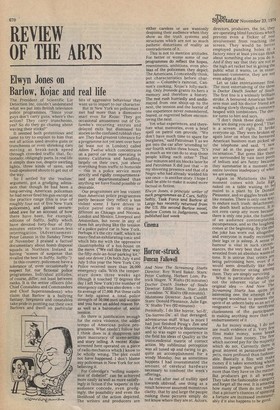REVIEW OF THE ARTS
Elwyn Jones on Barlow, Kojac and real life
The President of Scientific Lie Detection Inc. couldn't understand what we put into British television police programmes. "Since your guys don't carry guns, where's the, action? They carry truncheons, yes? So do they go chasing about waving their sticks?"
It seemed both pretentious and tame to try to explain to him that not all action need involve guns or truncheons or even shrieking cars moving at break-neck speed through crowded traffic that, fictionally, obligingly parts. In real life it simply does not, despite swirling lights, three kinds of siren, and loud-speakered shouts to get out of the way.
So I settled for the 'realism' argument, got a grudging admission that though he had been a long-serving American policeman he had never fired his gun except at the practice range (this is true of roughly four out of five New York policemen), and gained unvarnished awe for an account of how there have been, for example, editions of Softly, Softly which have devoted forty-four of fifty minutes entirely to action-less interrogation. (Advertisement: Peter Lennon in the Sunday Times of November 3 praised a factual documentary about bomb disposal squads in Northern Ireland as having "scenes of suspense that rivalled the best in Softly, Softly.'!)
In this country, policemen have a tolerance of, even occasionally a respect for, our fictional police programmes. Individual attitudes, of course, differ; not least between ranks. It is the senior officers (the Chief Constables and Commanders and Chief Superintendents) who claim that Barlow is a bullying fantasy. Sergeants and constables take pride in pointing out their own Barlows and dwell on particular bits of aggressive behaviour they want us to impart to our character.
But in New York no policeman I met had more than a dismissive snarl even for Kojac. They got occasional amusement out of Columbo's recurring entries and delayed exits but dismissed his stories as the confused rubbish they are. They had greatest tolerance for a programme not yet seen over here (at least not in London) called Adam Twelve which concentrates on a patrol car team operating in sunny California and handling, largely on their own, just about everything from traffic to homicide this in a police service more strictly and rigidly compartmentaised and departmentalised than anything we have found possible or desirable.
Our programmes are less violent than American police programmes partly because they reflect a less violent scene. I have driven in police patrol cars in cities as different as Chicago and Nicosia, London and Mexico, Liverpool and Amsterdam, but never in any of them felt anything like the tension of a police patrol car in New York. Perhaps it's the city itself, which so many find an exhilarating tonic and which hits me with the oppressive claustrophobia of a hot-house on the move. ('We call this thru* way the fifty-mile-an-hour parking lot," said one driver.) On both July 4 and July 5 this year the New York City Police received more than 26,000 emergency calls. With the temperature down three weeks ago (though it touched 72 degrees the day I left New York) the number of emergency calls was also down to its average of 17,000. Put these calls for help against a total police strength of 30,000 men and women and you have an added reason for, as well as a barometer of, social tension.
So there is justification enough for the extra violence, the added tempo of American police programmes. What needn't follow but 1 think does is a sloppiness and plain inaccuracy of scene-setting and story telling. A recent Kojac screened here operated on a piece of radio mechanics which! know to • be wholly wrong. The plot could not have happened. I don't blame any policeman in New York for not believing it.
For Coleridge's "willing suspension of disbelief" can be achieved more easily as well as more satisfyingly in fiction if the 'experts' in the audience concede, even grudgingly, the possibility and even the likelihood of the action depicted. The writers and producers are either careless or are wantonly despising their audience when they show as the truth systems and structures which are not so much pathetic distortions of reality as contradictions of it.
This is not to mention attitudes. For better or worse some of our programmes do reflect the hopes, resentments, ambitions, even phobias of the policemen they depict. The Americans, I conceitedly think, put characteristics before character Columbo's raincoat, Cannon's cooking, Kojac's lolly-sucking. Only Ironside grants its hero a memory and therefore a history. The rest rush hurriedly and undismayed from one shoot-up to the next, the tension and the horror of one experience never remembered, feared, or regretted before encountering the next.
Yet what experiences, and therefore what memories, even a brief spell on patrol can provide. -We don't have much time to spare for burglaries," said Patrolman Y as we got into the car after 'attending to' our fourth within three hours. "It's as much as we can do to stop those people killing each .other." That four minutes and six blocks later he and Patrolman X did just that in my shivering presence and that of a Negro who had already wielded his axe once is another story. I hope I shall be able to make it sound more factual in fiction.
Elwyn Jones, a principle writer of such programmes as Z Cars, Softly Softly, Task Force and Barlow at Large has recently returned from the US. His second Barlow novel, Barlow Comes to Judgement, was published last week


































 Previous page
Previous page